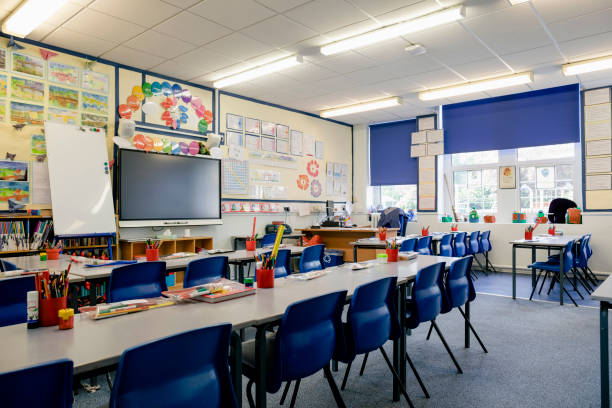Education
Mrs. Geeder Rosenwald School: A Beacon of Educational Legacy

The Rosenwald Schools are a historic chapter in American education. Established in the early 20th century, these schools were part of a groundbreaking initiative to improve education for African American children in the segregated South. Among these, the Mrs. Geeder Rosenwald School stands as a remarkable example of community effort and educational advancement.
Who Was Mrs. Geeder?
Mrs. Geeder is often associated with the efforts surrounding the Rosenwald Schools, though her direct contributions remain less documented than those of Julius Rosenwald, the philanthropist behind the project. Her name symbolizes dedication, representing countless individuals who championed education during a time of inequality.
Origins of the Rosenwald School Program
The Rosenwald School initiative began in 1912, thanks to the partnership between Julius Rosenwald, a Sears, Roebuck & Co. magnate, and Booker T. Washington, an influential African American leader. Together, they sought to tackle the lack of educational facilities for African American children.
The Purpose of Rosenwald Schools
The primary goal of the Rosenwald Schools was to bridge the educational gap. These schools were designed to provide a better learning environment for African American children, ensuring they had access to basic education, an opportunity often denied under the segregated system.
Design and Architecture of Rosenwald Schools
The schools were built with practicality in mind. Standardized designs allowed for cost efficiency, proper lighting, ventilation, and functional layouts. The Mrs. Geeder Rosenwald School, like others, incorporated these elements to create a conducive learning environment.
Community Contributions to the Schools
One of the most unique aspects of the Rosenwald Schools was the community involvement. Local families and leaders contributed labor, land, and funding to make the schools a reality. The Mrs. Geeder Rosenwald School serves as a testament to this spirit of collective effort.
Educational Impact of the Schools
The Mrs. Geeder Rosenwald School played a pivotal role in shaping the lives of its students. By providing access to quality education, the school opened doors to better opportunities for African American children, fostering hope and resilience in challenging times.
Challenges Faced During Establishment
Building the Rosenwald Schools was not without obstacles. Racism, limited resources, and resistance from local governments often posed significant challenges. However, unwavering determination ensured these schools were built and operational.
The Role of Teachers in Rosenwald Schools
Teachers in the Rosenwald Schools were more than educators; they were community leaders and advocates for progress. The dedication of teachers at the Mrs. Geeder Rosenwald School exemplified this commitment to nurturing young minds.
Decline of Rosenwald Schools Post-Integration
With the desegregation of schools following the Civil Rights Movement, many Rosenwald Schools were abandoned or repurposed. The Mrs. Geeder Rosenwald School faced similar challenges, marking the end of an era for these vital institutions.
Restoration and Preservation Efforts
Today, efforts are underway to preserve the legacy of Rosenwald Schools. The Mrs. Geeder Rosenwald School has become a focal point for restoration, ensuring its historical significance is not forgotten.
Legacy of the Mrs. Geeder Rosenwald School
The legacy of the Mrs. Geeder Rosenwald School is one of empowerment and progress. It stands as a reminder of the importance of education and community collaboration in overcoming systemic barriers.
Lessons Learned from the Rosenwald Schools
The success of the Rosenwald Schools teaches valuable lessons about the power of philanthropy, grassroots efforts, and the transformative impact of education on marginalized communities.
The Importance of Preserving Educational History
Preserving sites like the Mrs. Geeder Rosenwald School is essential to understanding the history of education in the United States. These schools highlight the struggles and triumphs of African Americans in their pursuit of equality.
How to Support Preservation Efforts
You can contribute to preserving the legacy of Rosenwald Schools by supporting local history initiatives, donating to restoration projects, or educating others about the importance of these historical landmarks.
Conclusion
The Mrs. Geeder Rosenwald School represents a significant chapter in the history of American education. Its story of resilience, community effort, and the fight for equality continues to inspire. By preserving its legacy, we honor the sacrifices and dreams of those who believed in the transformative power of education.
FAQs
What is a Rosenwald School?
Rosenwald Schools were educational institutions built to provide better learning opportunities for African American children during segregation.
Who funded the Rosenwald Schools?
The schools were funded through a partnership between philanthropist Julius Rosenwald and local communities, with additional support from Booker T. Washington.
What was unique about the design of Rosenwald Schools?
Their design emphasized cost efficiency, proper lighting, and ventilation, creating an effective learning environment.
Are Rosenwald Schools still in use today?
While many have been abandoned or repurposed, some have been restored as museums or community centers.
How can I learn more about the Mrs. Geeder Rosenwald School?
You can visit local archives, historical societies, or support restoration projects focused on preserving its legacy.
Education
Classroom 15x: Revolutionizing Education for the Future

The Evolution of Classroom Learning
Traditional classrooms have undergone significant transformations, yet challenges in engagement, efficiency, and accessibility persist. Classroom 15x has been introduced as an innovative solution, integrating advanced technology with modern teaching methodologies. By addressing limitations, a seamless and dynamic educational experience has been created.
Key Features of Classroom 15x
This revolutionary system incorporates smart boards, adaptive learning software, and real-time analytics. Additionally, students benefit from personalized learning paths, ensuring optimized progress. Furthermore, collaborative tools enhance interaction, fostering a sense of community among learners. The incorporation of artificial intelligence supports individualized instruction, making learning more effective.
The Role of Technology in Classroom 15x
Modern technological advancements are fully integrated into Classroom 15x. Augmented reality (AR) and virtual reality (VR) provide immersive experiences, helping students grasp complex concepts. Moreover, cloud-based platforms allow access to resources from any location, increasing flexibility. Consequently, traditional barriers to education are minimized, promoting inclusivity.
Benefits for Students and Educators
Students experience increased engagement, improved comprehension, and enhanced retention. Meanwhile, educators are equipped with data-driven insights, facilitating informed instructional decisions. Additionally, grading automation reduces administrative workload, enabling teachers to focus on interactive learning strategies. By embracing this model, classrooms evolve into more student-centric environments.
Overcoming Implementation Challenges
Despite its advantages, certain challenges must be addressed. Initial costs, infrastructure upgrades, and digital literacy pose hurdles. However, through strategic investment and comprehensive training programs, successful adoption can be ensured. Institutions must prioritize long-term benefits, ensuring seamless integration.
The Future of Classroom 15x
Education continues to evolve, and Classroom 15x represents a significant leap forward. With ongoing advancements, further enhancements will be introduced, refining the learning experience. As adoption increases, a global impact is anticipated, shaping the future of education. Ultimately, students and educators will benefit from a more efficient and adaptive system.
Education
Weather Related Event Closings: Stay Informed and Prepared

Weather Related Event Closings: Understanding Their Impact
Weather-related event closings significantly disrupt daily life. Schools, businesses, government offices, and entertainment venues often shut down due to extreme weather conditions. The primary reason for these closures is safety. Hazardous road conditions, power outages, or structural damage caused by storms make it difficult to ensure the well-being of people attending scheduled events.
Sudden changes in weather affect both short-term and long-term planning. A snowstorm, for example, may force schools to cancel classes for multiple days. Similarly, hurricanes require businesses to shut down as a precaution. Knowing the reasons behind these closures helps individuals prepare accordingly, reducing the risk of last-minute disruptions.
Common Weather Conditions That Cause Event Closings
A variety of weather conditions can lead to event cancellations. While some are predictable, others develop unexpectedly. The following weather events frequently result in closures.
Snowstorms and Ice Storms
Heavy snowfall and ice accumulation pose significant risks to transportation and infrastructure. Roads become slick, and visibility decreases, making travel unsafe. Schools and businesses often close due to impassable roads. Icy conditions lead to vehicle accidents, slips, and falls, creating further hazards. Municipalities usually declare emergency closures in advance when snow accumulation is expected.
Hurricanes and Tropical Storms
Hurricanes bring heavy rainfall, powerful winds, and widespread flooding. These conditions force authorities to announce closures in advance. Coastal areas are particularly vulnerable, as storm surges damage buildings, roads, and power lines. Mandatory evacuations often accompany hurricane-related closings, urging people to seek shelter in safer locations.
Thunderstorms and Tornadoes
Severe thunderstorms and tornadoes develop quickly, making closures necessary with little notice. Lightning, hail, and strong winds cause power outages, downed trees, and structural damage. Since tornadoes move unpredictably, authorities prefer to cancel events rather than risk exposing people to dangerous conditions.
Extreme Heat and Wildfires
Heatwaves and wildfires have led to increasing event cancellations. Excessive heat impacts outdoor gatherings, sports events, and school schedules. Organizers cancel activities to prevent heatstroke and dehydration. Wildfires spread rapidly, making road travel hazardous due to smoke and poor visibility.
Heavy Rain and Flooding
Even moderate rainfall can lead to dangerous flooding. Flash floods make roads impassable, stranding vehicles and endangering pedestrians. Low-lying areas experience the greatest impact, forcing residents to evacuate. Flooded roads prevent access to schools, workplaces, and event venues, leading to widespread cancellations.
How Closures Are Announced and Communicated
Authorities use various methods to announce weather-related event closings. In the past, radio and television stations were the primary sources of updates. However, digital platforms now provide real-time notifications.
Emergency Alert Systems
Government agencies send emergency alerts via text messages, phone calls, and sirens. These alerts notify residents of incoming storms, evacuation orders, and immediate closures.
News Channels and Weather Reports
Local news stations broadcast live updates about weather conditions. Meteorologists track storm developments and predict their impact, allowing businesses and schools to prepare for potential closures.
Social Media and Official Websites
Organizations frequently update their social media accounts with closure information. Schools, businesses, and local governments use Facebook, Twitter, and official websites to inform the public. These platforms allow real-time engagement, ensuring that people receive updates quickly.
Email and SMS Notifications
Subscribers receive direct notifications from event organizers, workplaces, or schools regarding cancellations. Many businesses use automated systems to alert employees and customers about unexpected closures.
Apps and Weather Tracking Tools
Mobile applications provide instant weather alerts and closure updates. Many local governments encourage residents to download official emergency preparedness apps. These tools offer interactive maps, safety tips, and live notifications.
Preparing for Weather-Related Closings in Advance
Since extreme weather is often unpredictable, preparation remains the best approach to handling closures. Having a plan in place reduces stress and ensures safety.
Creating an Emergency Kit
Emergency kits contain essential supplies to sustain individuals during weather-related disruptions. A well-stocked kit should include bottled water, non-perishable food, a flashlight, extra batteries, a first-aid kit, and medications. Power banks for mobile devices are also recommended in case of outages.
Monitoring Weather Reports Regularly
Checking daily weather updates helps people stay informed about potential risks. Reliable sources such as the National Weather Service or local meteorologists provide accurate forecasts.
Establishing a Communication Plan
Families and workplaces should discuss emergency procedures in advance. Knowing where to seek shelter and how to stay in contact during closures is essential. Parents should coordinate with schools to understand pickup procedures in case of early dismissals.
Adjusting Travel Plans Accordingly
Flight delays and road closures are common during severe weather. Travelers should monitor airline updates and have contingency plans in place. Booking flexible tickets or travel insurance helps minimize losses during disruptions.
Understanding the Economic Impact of Weather-Related Closings
Event closures due to weather conditions have significant financial consequences. Businesses lose revenue when operations halt, and workers may face wage losses. The economy, especially in weather-sensitive industries, suffers from prolonged disruptions.
Business and Workplace Losses
Retail stores, restaurants, and service industries experience decreased sales when forced to close. Employees who rely on hourly wages are most affected. While some businesses allow remote work, many industries require physical presence, making closures unavoidable.
School and Academic Disruptions
School closures disrupt lesson plans and academic progress. While virtual learning helps mitigate these losses, not all students have access to the necessary resources. Weather-related cancellations extend school calendars, delaying breaks and vacations.
Event and Entertainment Industry Challenges
Concerts, sports games, and festivals face major losses due to weather-related cancellations. Ticket refunds, rescheduling costs, and logistical issues add financial strain to organizers.
Preventative Measures to Reduce Closure Impact
While weather-related closings are sometimes unavoidable, strategies exist to minimize disruptions. Communities, businesses, and individuals can take preventive steps to stay operational.
Implementing Remote Work and Online Learning
Many companies have adopted remote work policies to maintain productivity during closures. Schools offering virtual learning platforms ensure that students continue their education despite weather disruptions.
Strengthening Infrastructure and Emergency Response
Investing in resilient infrastructure prevents long-term closures. Cities that maintain clear drainage systems reduce flooding risks. Businesses with backup power sources avoid prolonged shutdowns during outages.
Establishing Clear Emergency Protocols
Organizations that establish clear emergency response plans handle closures more efficiently. Employees, students, and residents benefit from predefined procedures that guide them during weather-related shutdowns.
Conclusion
Weather related event closings are unavoidable, but preparation and awareness significantly reduce their impact. Severe weather conditions, ranging from snowstorms to hurricanes, force closures to prioritize safety. Understanding how authorities announce cancellations, preparing emergency kits, and monitoring weather reports allow individuals to navigate disruptions more effectively. Businesses, schools, and event organizers benefit from proactive measures that maintain continuity. As weather patterns become increasingly unpredictable, staying informed remains the best strategy for handling event closures with minimal disruption.
Education
9 Tips for Mastering the Tools of Engraving

Engraving is a very delicate skill and has a very deep and long history. Whether you want to carve one-of-a-kind pieces of art or add decoration to your jewelry, carving is a great way to better utilize your creative ideas. Therefore, engraving is a very worthwhile skill to learn, and we will go into detail with tips on how to use engraving tools like a pro.
If you want to learn more points and tips about carving, there’s bound to be something on Lakimitools that interests you!
1. Use the right tools
Engraving has become easy nowadays and most people can master the skill. This is because there are a variety of professional engraving tools on the market today, such as engraving knives, pneumatic engravers, rotary tools, and laser engravers. Each tool has different advantages and drawbacks, and it is important to find the right one for you.
Hand engraving, for example, requires the use of a number of specialized engraving knives that allow for fine, special, and longer lasting engraving designs, and are better suited for engraving soft metals like gold and silver. Rotary tools are suitable for engraving a wide range of materials, such as metal, wood, and glass.
Choosing the right engraving tool can make engraving easier and accomplish more detailed engraving work. At the same time, I recommend you to wear a stereo microscope, which can help you complete more detailed engraving work, so that you can easily get beautiful engraving works.
2. Keep your tools sharp
Keeping your tools sharp will not only help you to carve your design more accurately and with less effort, but it will also help you to avoid damaging your original design because of a dull tool.
You can use a sharpening stone or other sharpening tools to keep your carving knives sharp and to take better care of your carving knives. Regularly check your rotary tool’s bits as it will wear out with time and carving, check it regularly and replace it properly.
3. Practice
Before formal carving, practice with some discarded metal, you can better find the feel, better understand the steps and techniques of carving, more practice can also improve your carving skills and experience.
Practicing will also help you understand the weight, speed, and maneuverability of the tool. As well as understanding the different effects of carving at different pressure speeds, it is more important to avoid making serious mistakes in the final work and losing a lot of value. That is why it is important to practice on discarded materials, especially if they are the same materials as the final piece you want to finish.
4. Steady hand
Carving requires a smooth hand to be able to carve smooth, consistent lines. Finding support on a fixed plane can help stabilize the hand. Also take breaks, as overworking can make the lines unstable. Also maintaining even, slow breathing while carving will help keep the lines smooth.

5. Adjusting speed and pressure
Different materials use different pressures because different materials have different hardnesses. For example, softer materials such as wood and acrylic require only lighter pressure to achieve the effect you want. Harder materials such as stainless steel, on the other hand, require the use of more pressure or the use of a rotary tool to accomplish this. When using the rotary tool, you can experiment with different speeds to achieve the engraving effect.
6. Using Stencils
If you want to make your carving more precise, you can better realize your carving idea by making a draft or using a stencil. For example, use a marker to draw your design on your carving material. Or print out your design and transfer it to the material you want to carve on. If you have a simple design, you can of course just engrave it, or if you want to be more accurate, you can start shallow and then go deeper.
7. In a well-lit space
Choose a well-lit and ventilated space for carving. Adequate light is conducive to better discover the details of the carving and ensure the accuracy of the carving. Use tools such as a magnifying glass for better carving details.
8. Safety measures
In the process of carving, there are some potential dangers. Take safety measures, you can better protect yourself, for example, in the process of carving, there may be debris flying out, with goggles can ensure that your eyes from injury. Some materials produce fine particles during the carving process, such as wood and acrylics. Wearing a dust mask will prevent them from being inhaled.
9. Cleaning
After you have finished carving, you need to clean your work area. This is because debris or dust can damage the life of your carving tools and reduce the efficiency of your carving. Use a soft cloth or brush to clean your engraving tools and then store them in a safe, dry, ventilated environment.
Summarize
Carving is a craft that combines technique and art. Choosing the right tools and practicing regularly will improve your technique and experience skills. You will be able to better utilize your creativity and complete your own carving works. Wearing goggles and a dust mask during the carving process can better protect you from injury and make it safer and healthier.
-

 Blog3 months ago
Blog3 months ago鲁Q 669FD: Understanding Vehicle Registration in China
-

 Blog3 months ago
Blog3 months agoSwatapp.me المانجا: Your Gateway to the World of Manga
-
Tech6 months ago
IPv6 Internet Is Broken
-

 Tech2 months ago
Tech2 months agoWepbound: The Future of Web Development
-

 Tech6 months ago
Tech6 months agoScamalytics: Revolutionizing Scam Detection in the Digital Age
-

 Business2 weeks ago
Business2 weeks agoUnveiling adsy.pw/hb3: Revolutionizing Content Marketing Strategies
-

 Tech6 months ago
Tech6 months agoWebmxhd: Revolutionizing Digital Connectivity
-

 Health3 months ago
Health3 months agoprostavive colibrim Benefits, Uses, and How It Works
